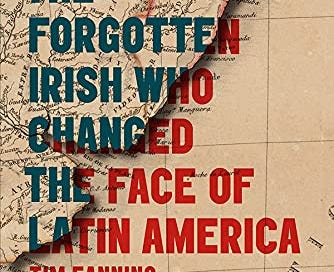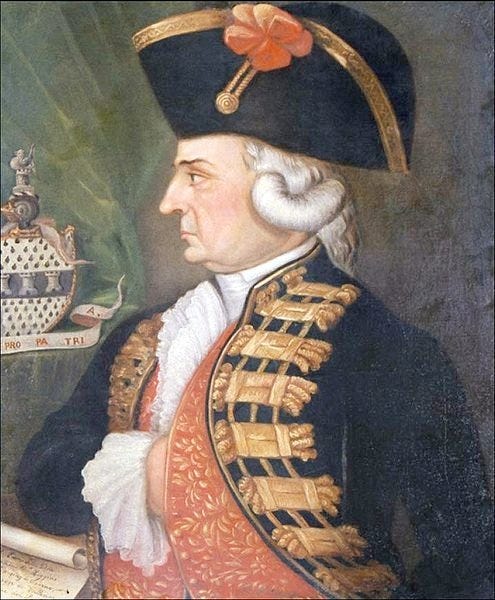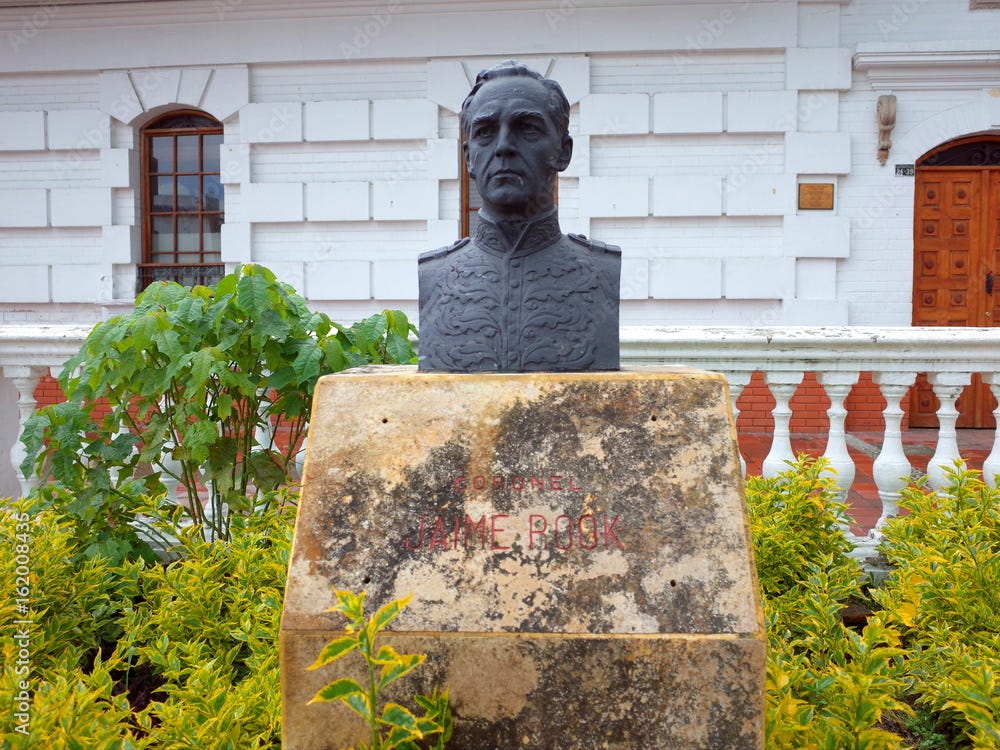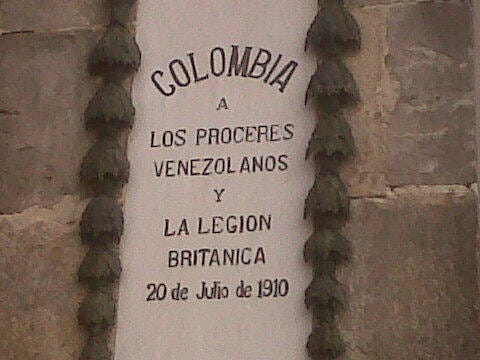‘Whichever country buries me’
James Rooke, 1770-1819: commander of Simón Bolívar's British Legion.
These blogs, serve as a way for me to express my interest in history and has so far centred on topics I have known about for some time. Topics and individuals which have been planned out and the focus of which was clear. I recently however came to learn of a new and rich chapter in Irish history, or at least to me it was new. A good friend of mine came across Arturo O’Neill, an Irish born colonel in the Spanish Imperial Army – 1st Spanish Governor of West Florida and 93rd Colonial Governor of Yucatán, Mexico. From this revelation came an interest to dig deeper into what appeared a rich history. How is it, that a Tyrone born man came to hold such high-ranking offices in the Spanish Empire.
The answer I got came in the form of a book by Tim Fanning, Paisanos: The Forgotten Irish Who Changed the Face of Latin America. Fanning’s book tells all the tales of incredible Irish individuals who played both crucial and secondary roles in the development of Latin America in the eighteenth and nineteenth centuries. Some were bulwarks of empire and others were liberators under Simón Bolívar's revolutionary forces – some were rulers of wide domains, others were generals taking orders, and all have interesting tales to be told.
Some names could sound familiar to people such as Ambrosio O’Higgins and his son Bernardo O’Higgins. Two generations of Irish born heavy weights in Spanish Imperial circles. Both represented opposite ends of the political spectrum. Fanning titles the chapter about Ambrosio ‘the King of Peru’, for in reality, that was as accurate a title as any. Ambrosio rose through the ranks of the Imperial colonial network to end up as the Viceroy of Peru, the centre of power in Colonial South America. His son, Bernardo? Would prove influential in his role to liberate the Chilean territory from the imperial yoke in the nineteenth century.
In Fanning’s book there can be found numerous stories of individuals, those who have been ‘forgotten’ - but, forgotten by who? I certainly had never heard of them, I’m sure I know many who are the same. This is possibly due to the fact that there exists little English-language literature and scholarship on the topic. In South America however, many of these figures are remembered as heroes. This is illustrated through the naming of streets and town squares with distinctly Irish names.
I would like to dwell on one of the smaller stories I came across while burrowing down this rabbit hole, that of James Rooke. Born in Dublin in 1770 to an Irish mother and English father – Rooke grew up to fulfil a family tradition of joining the British Army. He had a career which saw him fighting in both the Revolutionary Wars and Napoleonic Wars against France. In the interlude however, toward the end of the 1790s Rooke had however developed a keen taste for aristocratic life – hunting, shooting and gambling, all things which dragged him into deeper, and deeper debt.
He was eventually forced to sell all of his property off and abandon his family to flee to France in 1801, when hostilities had ceased, and a tentative peace held between Britain and France. Rooke was unfortunate enough to be in France when war broke out again and was imprisoned in ages 33, 1803 as a foreign citizen on enemy soil. Rooke would languish in Verdun as a prisoner until he managed to escape a decade later in 1813, fleeing to Cadiz, southern Spain where the Duke of Wellingtons headquarters were stationed. Joining up with the army again, we know that Rooke fought at Waterloo, Napoleon’s last stand – where he served as aide-de-camp to the Prince of Orange.
At the close of the wars in 1815 Rooke was a recent widower, and hungry for further adventure. He chose to visit his sister, now married to Colonel Probyn, Governor of St Kitts Island in the Caribbean. It is here that he heard of calls for volunteers in Venezuela under the command of Simón Bolívar, the liberator of Spain's South American colonies. It is in Venezuela with the title of Lieutenant Colonel that James Rooke commanding the British Legion of some 250 men, made a name for himself in the campaign of the Venezuelan Llanos (Plains) in 1818-19.
Bolívar chose to cross the Llanos in the rainy season, something nobody anticipated – not the Spanish forces, not even some of Bolivar’s own commanders, two of whom refused to follow. Rooke on the other hand promised:
‘if necessary, he would follow with the British Legion even beyond Cape Horn [the end of the world’.
Despite the miserable conditions faced, Rooke carried on with a calm and collected disposition:
‘pleased with everyone and with everything, and especially with himself. He seemed to be satisfied with the life he was living and not at all indifferent to it’.
This highlights the martial lifestyle Rooke had always known. Joining the ranks at a young age and surviving ten years in a French prison hardened him and he appeared to relish in the lifestyle of a military commander.

To further highlight the conditions faced by Irish volunteers in Latin America at this time, here is an extract from Fanning’s book:
‘The Irish soldiers who fought in South America in the early nineteenth century experience many privations. They endured endless forced marches through humid jungles, strength sapping climbs over dizzying mountain passes and long days of hunger and boredom in disease ridden Caribbean islands.’
It was much more than a walk in the park, literally, and the Spanish colonies represented one of the most challenging climates the Wild Geese would come to encounter.
Bolívar’s decision to cross the Llanos was mainly to surprise the Spanish but also to grant him access to the heart of the Viceroyalty of New Grenada, modern day Columbia. It is at the town of Vargas and the battle which ensued on 25 July 1818 that ushered the British Legion into the annals of Columbian history. Bolívar’s forces faced a better trained and provisioned Spanish force which occupied a defensive position on the heights and defeat looked imminent. Bolívar ordered Rooke to advance his British Legion up the hill through a hail of musket fire. This charge followed quickly by a cavalry charge saved the patriots from catastrophic defeat and won the day.
Rooke took two musket balls in his left arm and the Legions surgeon, a Thomas Foley from Kilkenny had to amputate it. When Foley asked who Rooke fought for, the Irish or the English, Rooke replied:
‘La patria que me dará sepultura//The country that shall give me a burial’.
There is a romantic retelling of the story which recalls Rooke, lifting his severed left arm with his good right one and proclaiming:
‘Viva la patria!//Long live the fatherland!’
He was left to recover in a monastery, the Augustinian house in Tunja where he died on 28 July 1818, just three days later.
To this day there remains a unit named after Rooke in the Columbian Military and statues can be found in his honour at Boyacá Bridge and the towns of Paipa and Duitama. In Paipa there can also be found a square with the name Parque Principal Jaime Rooke and at the main entrance to the Columbian capital, Bogotá, there is an inscription which reads ‘Columbia, a los Próceres Venezolanos y a la Legión Británica//Columbia, the Venezuelan heroes and the British Legion’.
The story of Rooke is but a footnote in the history of Irish born figures in the Spanish Empire and the liberation of its American colonies. There are many more individuals who made it to incredibly influential positions, be it Viceroy of an administrative region and virtual ruler of a country or the Prime Minister to a Spanish King. Fanning’s book provides a fascinating and important retelling of the stories of these men and women and is something that ought to play a more important role of understanding Irish history. It is important to know because from 1690 onwards and the flight of the Wild Geese across Europe and the world – Irelands history, more than ever, can no longer be constrained to the limits of the island of Ireland, it well and truly becomes an international and a transnational story.
Further Reading:
Tim Fanning, Paisanos: The Forgotten Irish Who Changed the Face of Latin America
Moisés Enrique Rodríguez, ‘James Rooke (1770-1819), commander of the British Legion in Bolívar's army’ in Irish Migration Studies in Latin America, online at https://www.irlandeses.org/0707_137to138.pdf.









Have you ever written about the Irish diaspora in Mexico?